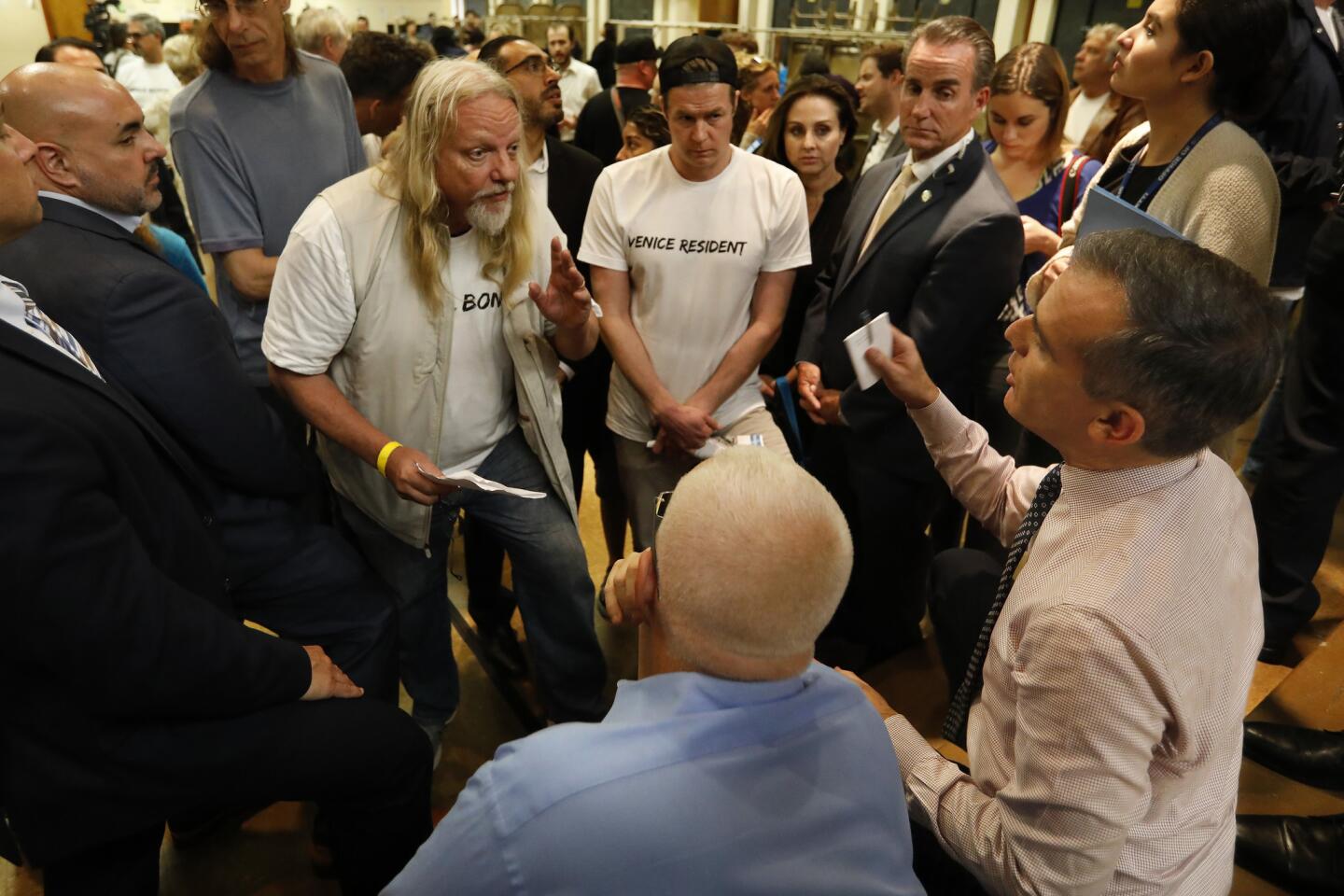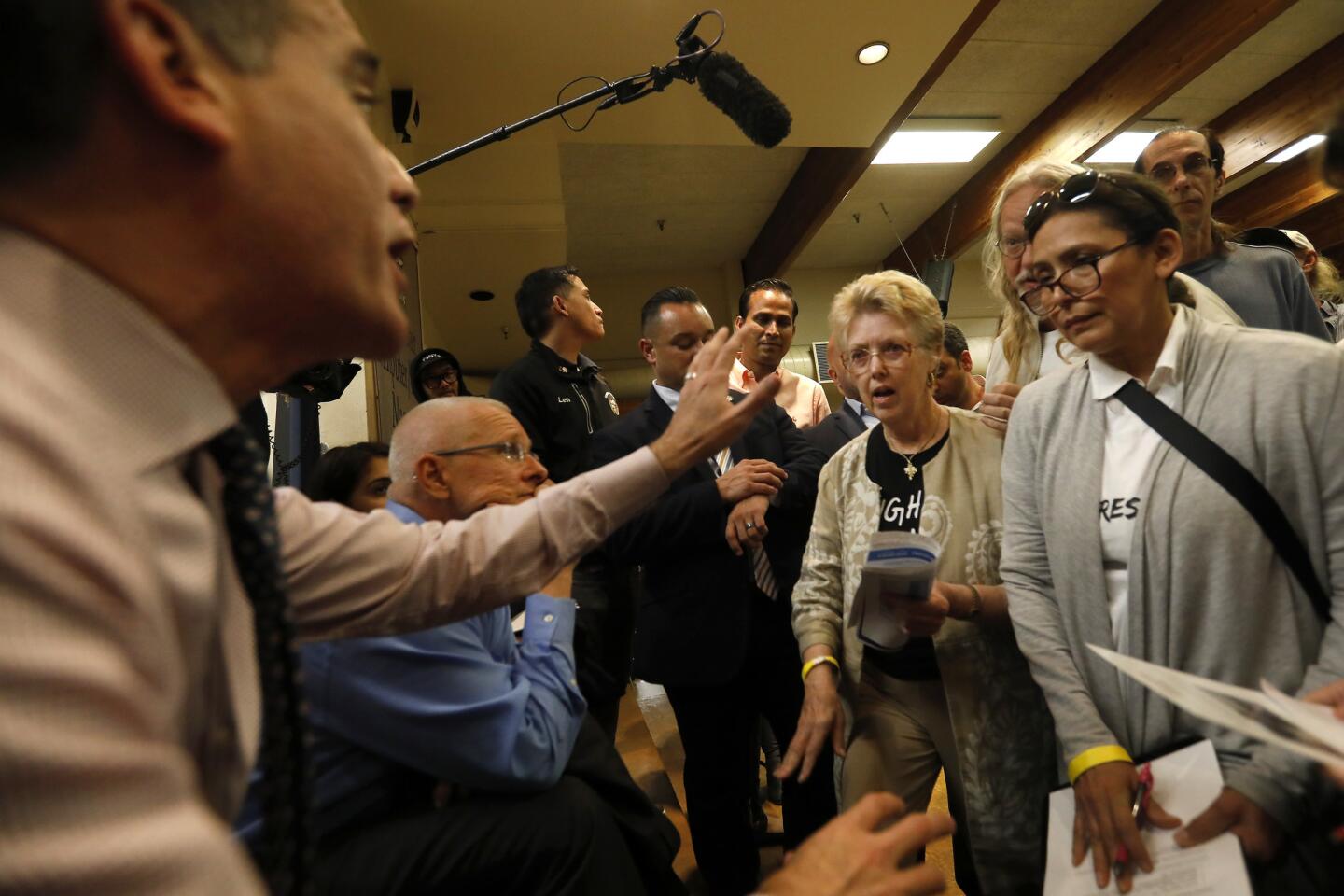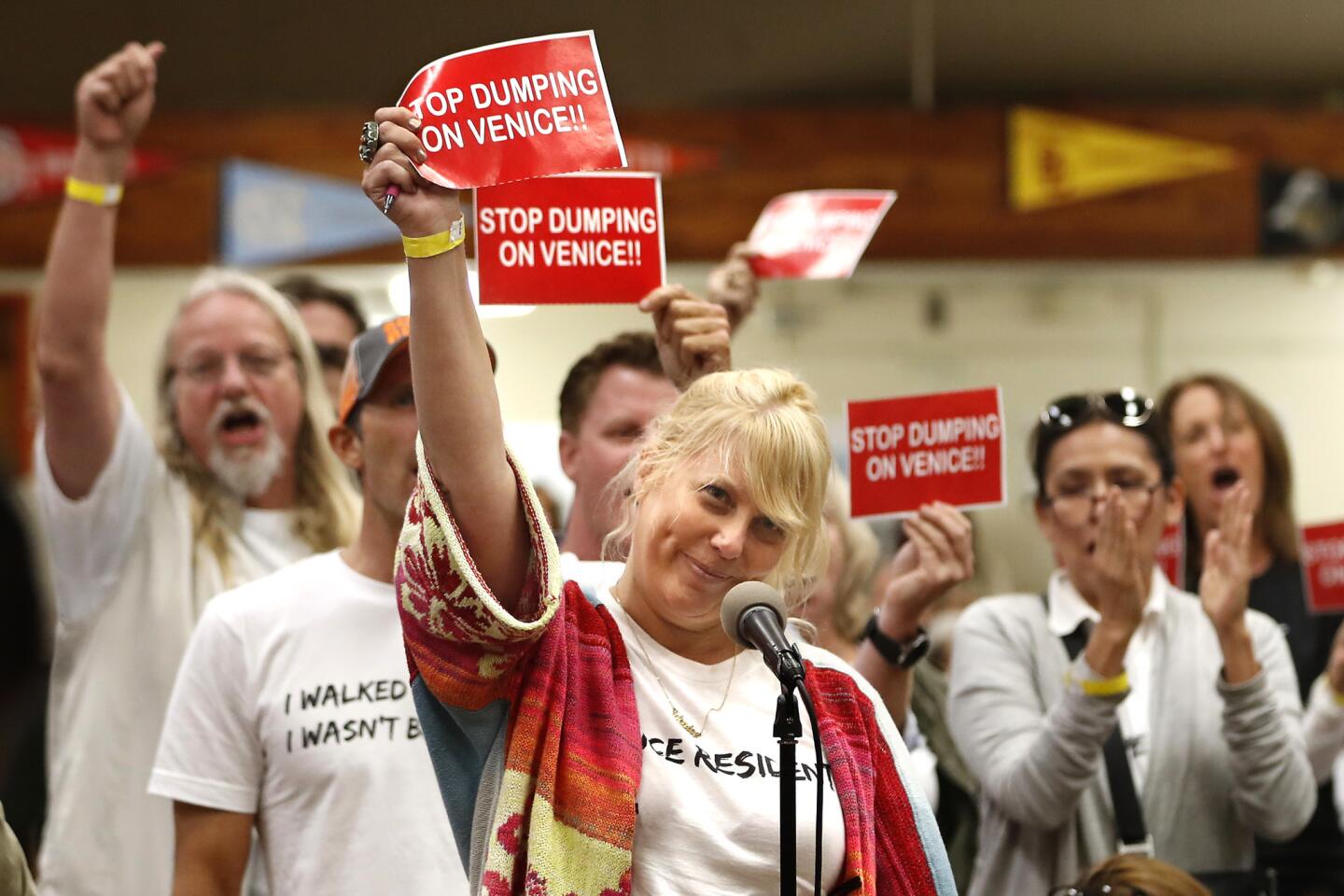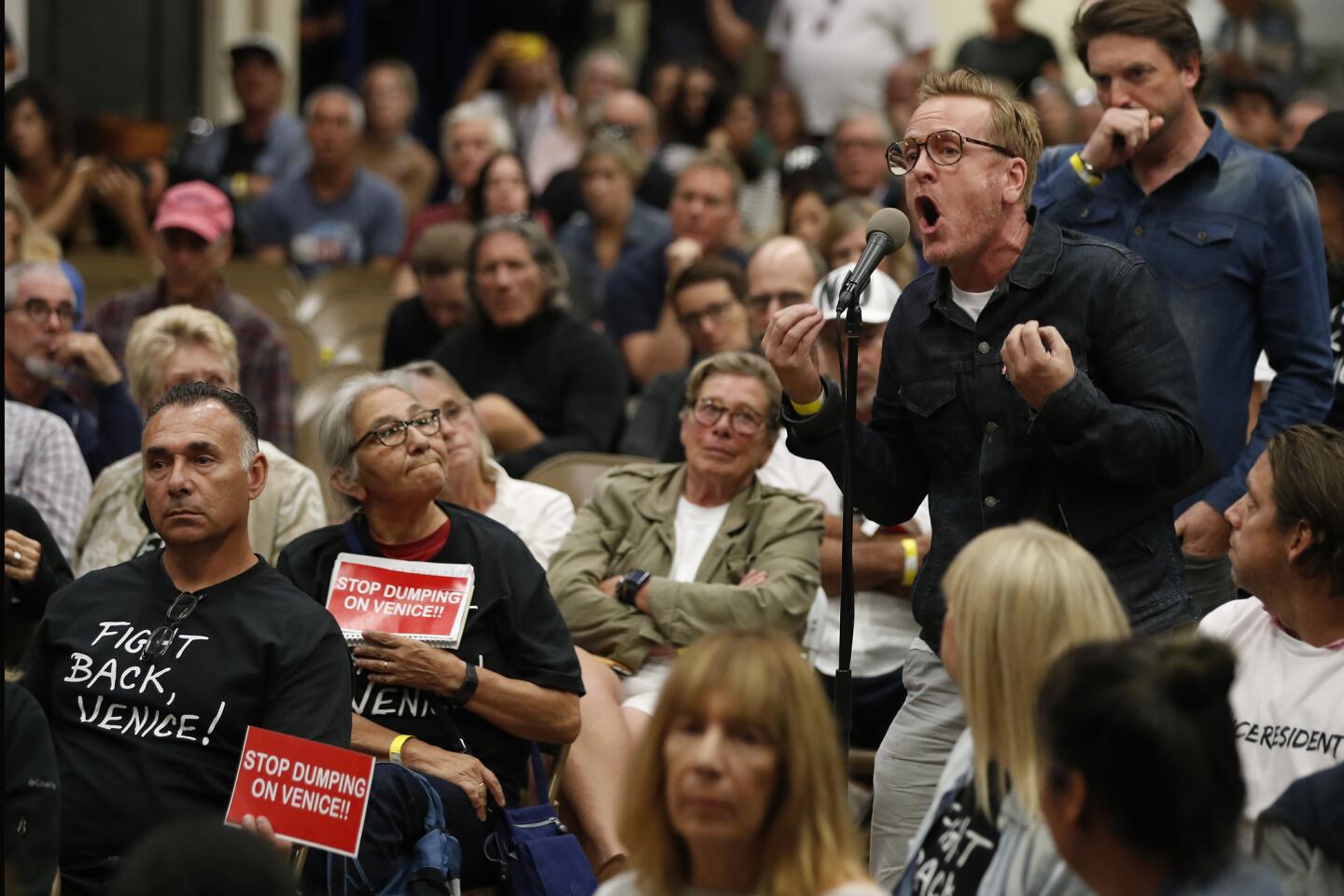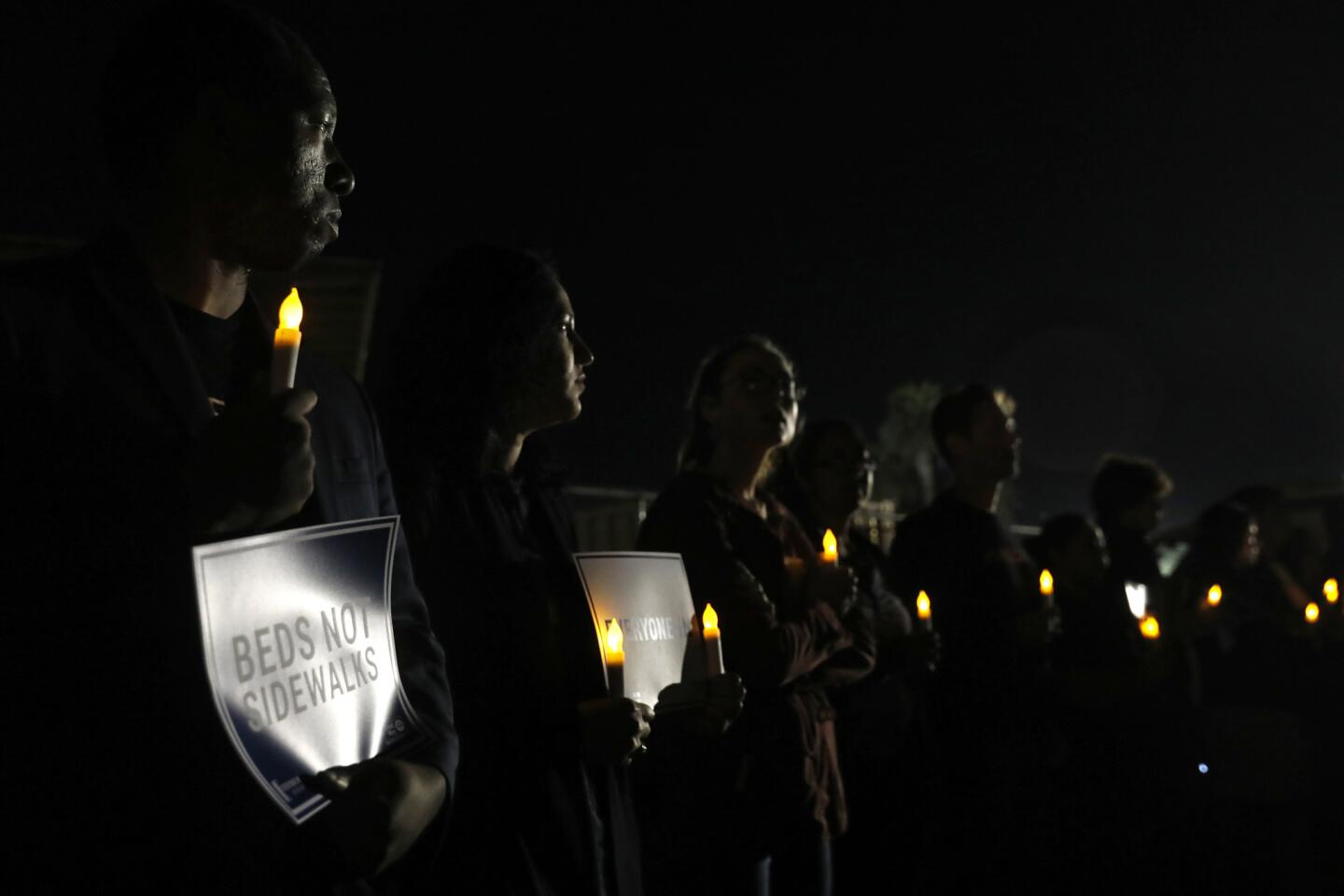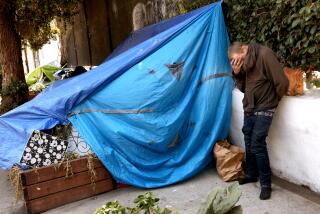Residents erupt in anger at Garcetti’s town hall for planned homeless shelter in Venice
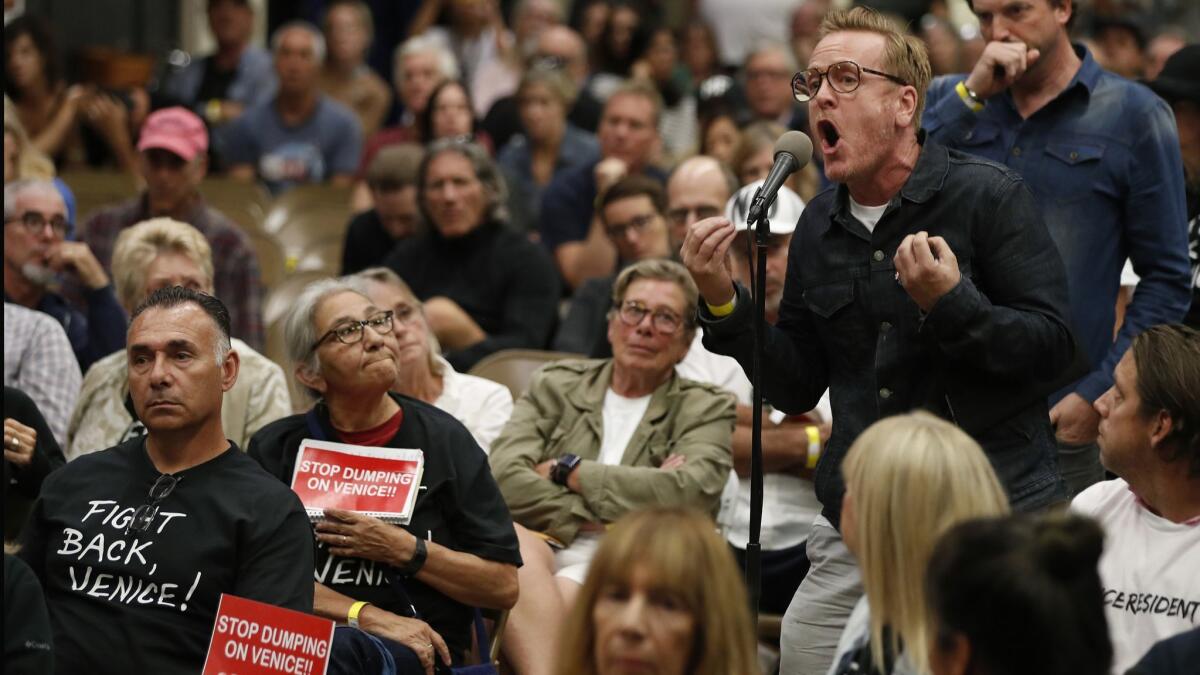
For four hours, Los Angeles Mayor Eric Garcetti took the heat from a crowd in Venice. Locals booed, catcalled and criticized the city’s plans to build a 154-bed homeless shelter on an abandoned Metropolitan Transportation Authority yard in the heart of the seaside community.
It was Garcetti’s first town hall to discuss his Bridge Home program, which seeks to put a temporary shelter in each of the city’s 15 council districts.
L.A. voters have committed more than $1 billion to providing housing for homeless people, whose continued presence on the streets has emerged as a critical issue both for the city and for Garcetti as he considers a run for president in 2020. But exactly where to put that housing — temporary and permanent — has become a vexing and emotional issue in recent months.
Proposed homeless shelters in Koreatown, Sherman Oaks and San Pedro have sparked anger and accusations that City Hall is ignoring residents’ wishes as officials pick sites. And many have looked to Garcetti for leadership to balance the need for housing with community concerns about blight and crime.
The moment came in Venice, where the mayor listened as residents vented and tried to make his case for shared sacrifice.
“The easy thing to do politically is to walk away,” Garcetti said several times, adding, “We can’t afford to walk away from homelessness.”
Residents unloaded at Wednesday night’s standing-room-only event, describing a culture of lawlessness in Venice that they said is fueled by homelessness. Frustration bubbled over as locals took turns at the microphone, talking about feces and drug needles in the alleys and beaches.
Some said the new shelter would attract more vagrants to the area. Others questioned why anyone would leave the shelter — a free home in one of the most desirable and expensive parts of the city — and move into permanent housing in another neighborhood.
After shushing the audience repeatedly; asking for respect that was sometimes granted, at other times not; then fielding dozens of questions that devolved into angry rants, Garcetti sat and listened.
The mayor, joined by Police Chief Michel Moore and Westside Councilman Mike Bonin, stayed until after 10:30 p.m., when the last person who wanted their ear had left.
As he travels the country, Garcetti’s broader message is that he’ll be a unifying force amid “false divisions” created by President Trump and the Republicans. He’ll fly to Minnesota this weekend to speak at a state Democratic Party event and attend a fundraiser; he has traveled to five other states in the last month and a half, a spokesman said.
But Wednesday’s town hall was a reminder of the street-level criticism Garcetti faces at home over homelessness and quality-of-life issues like crime and filth. Garcetti has pledged to end street homelessness in a decade and maintains that the Bridge Home program could be key to getting people into housing.
Aides to the mayor, who are accustomed to hustling him away from events to keep on schedule, said he had instructed them to stand back as he fielded questions.
“You know your truth better than anyone else,” Garcetti told one resident after she complained about the neighborhood’s decline. He also talked about a homeless man who lives on his block in Windsor Square and the encampments he saw in Hollywood, which he represented as a city councilman.
Critics say the proposed site for the Venice shelter — a former Metro bus yard that spans more than 3 acres — would put an unfair burden on the neighborhood because of its size. They also argue that it is close to three schools and residences.
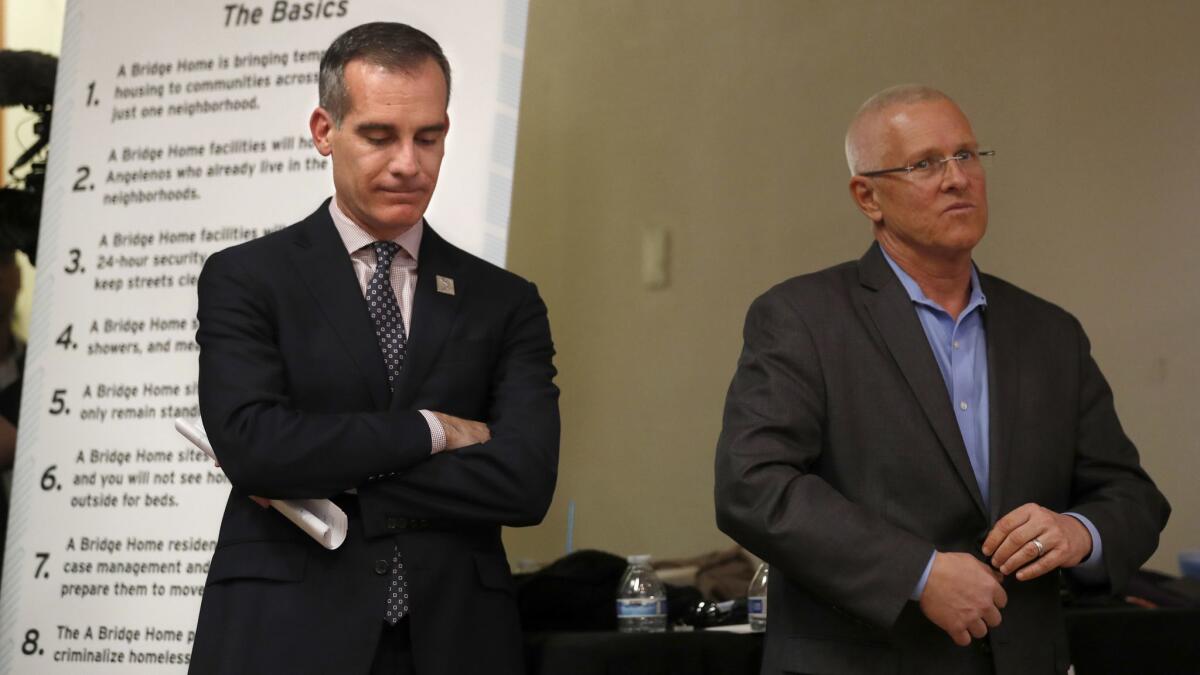
Bonin picked the site because it has the largest concentration of encampments on the Westside, his spokesman said. The temporary shelter would run for three years, with residents staying for an average of two to six months.
Residents wearing white T-shirts that read, “I live in Venice. I wasn’t bused in,” said in myriad variations that they think a homeless shelter will only attract more indigent people to Venice, aggravating the piles of trash, drug abuse and crime they already attribute to the neighborhood’s many homeless encampments.
“There is a difference between homeless people who are down and out and transients who want to come to the beach to party,” longtime resident Dara Lasky said late in the evening, setting off a round of chanting, “Not in Venice.”
Marie Hammond, a 30-year Venice resident, told politicians that residents regularly have their bikes stolen and later see homeless people selling off bike parts. “It’s rubbing it in our face,” Hammond said.
Others attacked the shelter’s planned location, within walking distance from Westminster Elementary School, where the event was held.
“You’re putting the most volatile people next to the most vulnerable,” one speaker said.
A smaller number of people who came to support the shelter shouted back, “They’re already here.”
Bonin, who faced the most acute criticism, echoed that view, defending the Venice location as necessary to meet the purpose of the shelter program.
L.A. will eliminate ‘veto’ provision for homeless and affordable housing to keep state funding »
If the purpose of the program is to reduce homeless encampments, he said, the logical place to put a shelter is near the encampments.
When Garcetti rolled out the Bridge Home program this spring, he said he would advocate for each proposed shelter to ensure residents’ support. He also told reporters he didn’t anticipate the shelters would get the kind of pushback seen in places including Orange County, where residents have fought the opening of homeless facilities.
Facing opposition, Garcetti strained to win over the Venice crowd. He said his program’s first shelter, which opened this month near downtown’s Olvera Street, is working to get people off the street. One new shelter resident tearfully told him that his bones no longer hurt because he has a bed, Garcetti said.
Garcetti posted a video on social media at the end of the town hall and said “over a dozen” people have been put into permanent housing since the shelter near historic El Pueblo launched. “That’s a faster pace than we’d seen,” Garcetti said.
Spokesman Alex Comisar clarified Thursday that five people living at the shelter have been matched with housing units and will eventually leave, but he said no one has moved out. One person from the street has been matched with permanent housing, and seven people were placed with other shelters, Comisar said.
One resident suggested Garcetti’s feedback was satisfying, while other residents left saying the shelter was being forced upon them.
There are no announced plans to take the old Metro yard off the table. Comisar said Thursday the mayor is “strongly supportive” of the sites selected by the council members.
“He is working actively with every council district to move these sites forward to meet our goal,” Comisar said.
Twitter: @dakotacdsmith
Twitter: @LATDoug
UPDATES:
5:15 p.m.: This article was updated with additional context.
4:35 p.m.: This article was updated with additional details, reaction and analysis.
This article was originally published at 9:55 a.m.
More to Read
Sign up for Essential California
The most important California stories and recommendations in your inbox every morning.
You may occasionally receive promotional content from the Los Angeles Times.
